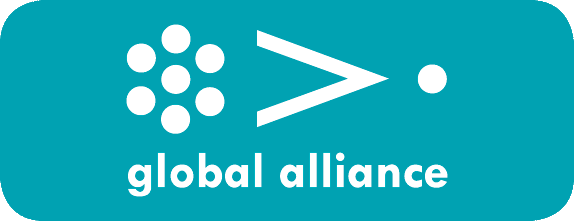These Guiding Principles for Ethical and Responsible Artificial Intelligence align with the Global Principles of Ethical Practice in Public Relations and Communication Management and have been approved by Global Alliance Board in their meeting on 2 April, 2024. These Guiding Principles are an integrated part of the Global Alliance for Public Relations and Communication Management ethical framework.
Global Alliance for Public Relations and Communication Management
Guiding Principles for Ethical and Responsible Artificial Intelligence
The Global Alliance for Public Relations and Communication Management (Global Alliance) Ethical and Responsible AI Guiding Principles provide ethical leadership for the global public relations and communication professions in the utilization of artificial intelligence. The broad and transformative opportunity presented by this technology is as exciting as it is daunting, and therefore the purpose of this document is to provide leadership for aligning our member associations under common guiding principles for the use of AI.
These principles align with the Global Code of Ethics and, when approved by the Global Alliance Board, they will be integrated into the Global Alliance for Public Relations and Communication Management ethical framework.
As artificial intelligence is an evolving technology, these are living guiding principles and will continually advance with the technology's usage and evolution. They do not stand alone but are supplements to a broader ecosystem of professional ethical standards, Global Alliance member association guidelines, and local laws. These principles are grounded in ethics and responsible behaviour and should always follow the 16 principles of ethics that the Global Alliance deems universal and fundamental to the practice of public relations and communication management.
The Six Global AI Guiding Principles for Responsible Communication:
Ethical Rigor:
Above all things, the utilization of artificial intelligence in the global public relations and communication professions must be met with the same ethical rigor that all other elements of the professional practices are held. This standard includes the code of ethics of the Global Alliance and its member associations.
Human Oversight and Governance:
The utilization of artificial intelligence in the public relations and communication professions requires human oversight and governance to ensure ethical and responsible use. Professionals must always act in the public interest. Human-led outputs should avoid plagiarism, trademark, and copyright infringements; correct misinformation and disinformation as identified; eliminate bias and promote fairness; and protect security and privacy of information in AI-generated outputs.
Personal and Organisational Responsibility:
Public relations and communication professionals and the organisations they represent are responsible for the content they produce with artificial intelligence. This responsibility requires a high level of research, due diligence, fact-checking and verification, and critical thinking to uphold professional integrity and counter the degradation of trust.
Openness and Transparency:
As artificial intelligence becomes more intertwined in our daily lives and can influence the decision-making process of individuals, organisations, and communities, the stakeholders and audiences must understand how AI is involved in developing the information they are receiving. Open disclosure and transparent use of AI-generated content, data, and interactions are essential. Research references generated through AI should have the necessary attribution and permissions for use.
Professional Development:
As public relations and communication professionals, it is our responsibility to remain informed and educated about using artificial intelligence in our professions. In addition, the Global Alliance and its member associations are responsible for supporting professional growth through ongoing guidance and professional development offerings around the ethical and responsible utilization of artificial intelligence in our practices and in the organisations we represent.
Advocacy:
Global Alliance member associations and public relations and communication professionals have a role in protecting the integrity of the professions and the practitioners. This responsibility requires advocacy and having an active global voice around ethical and responsible artificial intelligence. We must provide leadership and guidance within the organisations we represent.
Acknowledgements
These principles are created with the input of Global Alliance member associations, many of whom have done extensive work as leading voices and guides for their members.
Special thanks to Bonnie Caver (USA), Kia Haring (Finland), Justin Green (Ireland), José Manuel Velasco (Spain), Alastair McCapra (UK), Mark Dvorak (USA), Adrian Cropley (Australia), Jennifer Wah (Canada), Simon Murphy (Australia), Judy Dobbs (Canada), the Global Alliance Board of Directors (2024), and Global Alliance member associations (2024) for their insights and perspectives.
References and further reading
Global Alliance, Global Principles of Ethical Practice in Public Relations and Communication
Management
The key to ethical decision making is to identify which principles are in play. Once identified, we use a decision-making tree to guide us through a process that helps us arrive at an ethical decision. The ethical principles adopted by the Global Alliance are useful to keep in mind.
Here are the 16 principles that the Global Alliance deem universal and fundamental to the practice of public relations and communication management:
Guiding principles
1. Working in the public interest
2. Obeying laws and respect diversity and local customs
3. Freedom of speech
4. Freedom of assembly
5. Freedom of media
6. Honesty, truth and fact-based communication
7. Integrity
8. Transparency and disclosure
9. Privacy
Principles of professional practice
1. Commitment to continuous learning and training
2. Avoiding conflict of interest
3. Advocating for the profession
4. Respect and fairness in dealing with publics
5. Expertise without guarantee of results beyond capacity
6. Behaviours that enhance the profession
7. Professional conduct
www.globalalliancepr.org/code-of-ethics
CIPR, AI in PR Guides - https://www.cipr.co.uk/CIPR/Our_work/Policy/AI_in_PR_/AI_in_PR_guides.aspx
PRSA, PROMISE & PITFALLS: The Ethical Use of AI For Public Relations Practitioners
Guidance from the PRSA Board of Ethics and Professional Standards (BEPS) - https://www.prsa.org/docs/default-source/about/ethics/ethicaluseofai.pdf
IABC, IABC Guiding Principles for the Ethical Use of AI by Communication Professionals – https://www.iabc.com/About/Purpose/Ethical-Use-of-AI
Centre for Strategic Communication Excellence, Responsible Use of AI in the Communication Profession – https://thecsce.com/responsible-ai-for-the-communication-profession/
